December
Small Island Developing States & Climate Change News
Small Island Developing States & Climate Change News
Fiji Mangroves & Reefs | Granada Water Cons. | BVI Flood Resilience
Center for Sustainable Development
THIS MONTH’S NEWS: Follow links to see detailed information about community needs assessments & project solutions.
| 1. Yadua Village, Fiji: 200 people are suffering climate change induced rising sea levels | |
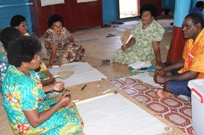 |
Partners Loraini Sivo (Fiji) and Fatema Rajabali (Kenya/UK) worked this year on a project in a small fishing village in Fiji.
|
|
200 people in the village of Yadua, Fiji are suffering from increased shoreline erosion caused by increased wave actions due to the loss of mangrove forest and a reef which acted as buffers—and climate change induced rising sea levels.
Their project is an ecosystem based adaptation program restoring mangrove and reef systems to act again as natural buffers.
|
|
| 2. 7 Years of extreme weather in Grenada increases malnutrition & poverty | |
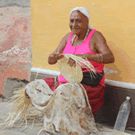 |
Meredith Waters (US) and Gillian Primus (Grenada) have been working for the past six months on a project on the Island of Grenada that has been hit by a series of tropical hurricanes and tropical storms exhibiting increased ferocity over the past seven years. |
|
The CBA program they designed relates to the challenges of climate variability: extreme weather, and unpredictable rainy season that have reduced crop harvests—and includes a Farmer Soil Conservation—and a Water Conservation and Management Program.
|
|
| 3. Climate change related drought plagues island farmers on Timor Leste | |
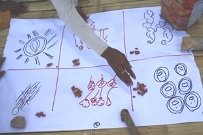 |
1,000 children and adults from 200 families in two villages in the Island country of Timor Leste suffer from an annual food shortage caused by inadequate water for irrigation leading to poor rice harvests, and from the challenges of adapting to a changing climatic pattern restricting when staple crops such as corn and cassava can be planted. |
| Michaelyn Bachhuber (US), Raul de la Rosa (Philippines/Timor Leste), and Yinwu Huang (China) worked during September and October to develop a CBA project in participation with these community members. | |
| 4. British Virgin Islands: Climate change induced heavy rains degrade coastal water quality & impact local economy | |
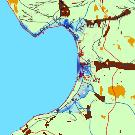 |
Climate change has caused an increase heavy rains on Tortola island and the storm water runoff causes flooding and deposits sediments and pollutants into the bay reducing water quality. Tourism is a major source of revenue for Tortola and this reduction in water quality has not only impacted a fragile environment—but has affected the island’s business economy. |
|
Angela Burnett and Atoya George of the British Virgin Islands Department of Conservation and Fisheries, and have been working on a project which includes a Community Flood Resilience Programme, a Drainage Maintenance and Improvement Programme, and a Sedimentation Reduction Programme
|
|
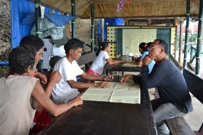 |
Jelly Mae Moring comes from a small village on the island of Mindanao in the Philippines: “I have been starting a project in my parents’ village in the the OL 341 CBA course, a perfect opportunity to learn how to develop a project with the people living in the community.” |
|
Climate variability (unpredictable start of rainy season and unusual dry periods), and extreme weather events have reduced the community’s harvests in both land and sea—reducing family incomes. Jelly May’s project includes a Coastal Resource Management Program.
|
|
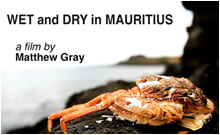 |
Matt produced this excellent short documentary addressing the impacts of climate change on water resources in Mauritius, an island in the Western Indian Ocean, and how people are beginning to respond.
|
|
Too much rain in May and drought conditions in November negatively affect farmers with both extremes. Rainfall is down 10 % but the intensity has increased. 50% of water stored in reservoirs is lost to leaks.
The film shows us how having supplies of water resources and managing them are 2 different things.
|
|
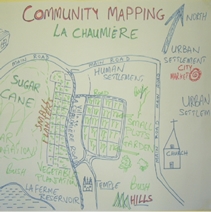 |
Prem Goolaup, of the island state of Mauritius in the Indian Ocean, has been developing a community based adaptation project for the past eight months. At times the farmers suffer from drought—at other times flooding.The adaptation components of his project include a Water Management Program.
|
|
He’s using a participatory mapping technique to not only learn more about the specific challenges the farmers face, but by including farmers in the research and drawing of the map, they are better understanding their current challenges and also developing a sense of ownership for the project. What is a prioritization of the community’s greatest hazards they face?
Farmer adaptation strategies include:
|
|
| 8. 300 Hands-On Field Activities for Community Based Adaptation Projects: Water is the Underlying Theme | |
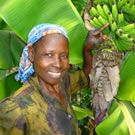 |
I am announcing an updated compilation of Community Based Adaptation Field Activities—complete with links to source materials and technical information.
This collection of 300 CBA field activities began as a resource for our CBA online students. However, as it grew, we decided that it was important to make it more broadly available to CBA development practitioners.
|
|
Here are how the activities are organized:
1. Agriculture and water.
2. Small island developing states. 3. Emergency preparedness and disaster risk reduction. 4. Energy. 5. Livelihood. 6. Health & sanitation. 7. CBA project design. 8. CBA participatory inclusion. 9. Long-term investments. 10. General resources. |
|
Would you like to learn how to develop Community Based Adaptation Projects?
What’s happening in the region where you live?
Please write us with your stories, thoughts and comments through Online.Learning@csd-i.org
Please write us with your stories, thoughts and comments through Online.Learning@csd-i.org
I look forward to hearing from you.
Sincerely,
Tim Magee, Executive Director
Would you like to subscribe to this newsletter?
The Center for Sustainable Development specializes in providing sound, evidence-based information, tools and training for humanitarian development professionals worldwide. CSDi is a 501(c)(3) nonprofit organization.